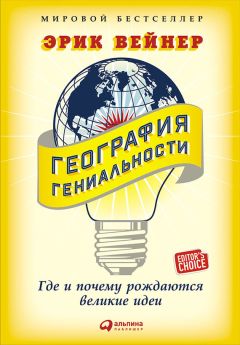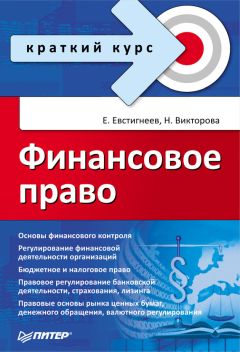Эрик Вейнер - География гениальности: Где и почему рождаются великие идеи

Помощь проекту
География гениальности: Где и почему рождаются великие идеи читать книгу онлайн
Работая над книгой, я активно использовал то, что мой покойный друг Лори Мастертон называла «золотой нитью». Люди (порой друзья, но часто и совсем посторонние) высказывали множество идей и предложений, которые неизменно приводили меня к нужному человеку в нужном месте и в нужное время. Некоторых из них я упомянул в книге, другие остались за кадром. Среди последних хочется упомянуть, в частности, Джоуи Катону, Росса Кинга, Иня Ци, Тома де Валя, Джерри Хоумза, Тома Крэмптона, Александру Кори, Кимберли Брэдли, Раджу Нарисетти и Дэна Мошави. Давид Баттистелла во Флоренции щедро делился со мной временем и знаниями.
Когда меня охватывала неуверенность, друзья спешили ободрить меня добрым словом или крепким напитком, а то и тем и другим сразу. Я благодарен Марку Лэндлеру, Анжеле Танг, Лоре Блюменфельд, Стивену Петроу, Мартину Реггу Кону, Карен Мазуркевич, Стиву Левайну, Нури Нурлибаевой, Трейси Валь, Джиму Беннингу, Ализе Маркус, Эндрю Апостолу, Дженнифер Ханавальд, а также Уоррену Рабину, который в этом смысле неподражаем. Я особенно признателен «Писателям, которые обедают» – моей неформальной, но важной группе поддержки: Мартену Тросту, Флоренс Уильямс, Тиму Циммерману, Дэвиду Гринспуну, Джулиет Эйлперин и Джошу Горвицу.
Мой агент, Слоун Харрис, всегда поддерживает меня, не дает отлынивать и не боится сказать, если я сделаю глупость. В Simon & Schuster неустанно трудились за сценой несколько человек: Меган Хорган, Джонатан Эванс и Сидни Танигава. Благодаря им книга стала лучше, за что я глубоко им признателен.
Мой редактор, Джонатан Карп, не считает себя гением. И напрасно. Мне на редкость повезло, что сбивчивый курс моего корабля выправляет настолько талантливый человек. Невероятно воодушевляла меня – в большом и в малом, сознательно и несознательно – моя дочь Соня. Она терпеливо выносила и мое отсутствие, и мое ворчанье – такое, когда ты присутствуешь, а слова не идут как надо.
Не будет преувеличением сказать, что я не сумел бы написать эту книгу без постоянной поддержки моей жены Шарон. Она моя муза и моя любовь, и мой genius loci всегда со мной, доколе со мной она.
И наконец с тяжелым сердцем благодарю Юджина Мартинеса. За то недолгое время, которое мы были знакомы, он стал для меня близким другом и надежным проводником. Мне его не хватает. Эта книга посвящается и его памяти.
Избранная библиография
Albert, Robert S., and Mark A. Runco. Theories of Creativity. London: Sage, 1990.
Amabile, Teresa. Creativity in Context: Update to the Social Psychology of Creativity. Boulder, CO: Westview, 1996.
Anderson, David Emmanuel et. al., eds. Handbook of Creative Cities. Cheltenham, UK: Edward Elgar, 2011.
Arieti, Silvano. Creativity: The Magic Synthesis. New York: Basic Books, 1976.
Austin, James H. Chase, Chance, and Creativity: The Lucky Art of Novelty. New York: Columbia University Press, 1978.
Barron, Frank X. No Rootless Flower: An Ecology of Creativity. New York: Hampton Press, 1995.
Baxter, Stephen. Ages in Chaos: James Hutton and the Discovery of Deep Time. New York: Tom Doherty, 2003.
Bell, Clive. Civilization. London: Penguin, 1928.
Beller, Steven. Vienna and the Jews, 1867–1938: A Cultural History. Cambridge: Cambridge University Press, 1989.
Boorstin, Daniel. The Creators. New York: Random House, 1992.
Bramly, Serge. Leonardo: The Artist and the Man. London: Penguin, 1994.
Braunbehrens, Volkmar. Mozart in Vienna: 1781–1791. New York: Grove Weidenfeld, 1986.
Briggs, John, and David F. Peat. Seven Life Lessons of Chaos: Spiritual Wisdom from the Science of Change. New York: HarperCollins, 1999.
Broadie, Alexander. The Scottish Enlightenment: The Historical Age of the Historical Nation. Edinburgh: Birlinn, 2001.
–, ed. The Cambridge Companion to the Scottish Enlightenment. New York: Cambridge University Press, 2003.
Brucker, Gene. Renaissance Florence. Berkeley: University of California Press, 1983.
Buchan, James. Capital of the Mind: How Edinburgh Changed the World. Edinburgh: Birlinn, 2007.
Burckhardt, Jacob. The Civilization of the Renaissance in Italy. New York: Random House, 1954.
Burke, Janine. The Sphinx on the Table: Sigmund Freud's Art Collection and the Development of Psychoanalysis. New York: Walker & Company, 2006.
Campbell, Donald. Edinburgh: A Cultural History. Northampton, UK: Interlink Pub Group, 2008.
Chaudhuri, Amit, ed. Memory's Gold: Writings on Calcutta. New Delhi: Penguin Viking, 2008.
–. On Tagore: Reading the Poet Today. New Delhi: Penguin Books India, 2012.
Chaudhuri, Sukanta, ed. Calcutta: The Living City, Volume 1: The Past. New Delhi: Oxford University Press, 1991.
–, ed. Rabindranath Tagore: Selected Poems. New Delhi: Oxford University Press, 2004.
Chitnis, Arnand C. The Scottish Enlightenment: A Social History. London: Rowan & Littlefield, 1976.
Cronin, Vincent. The Florentine Renaissance. London: Pimlico, 1992.
Csikszentmihalyi, Mihaly. Creativity: Flow and the Psychology of Discovery and Invention. New York: Harper Perennial, 1996.
D'Angour, Armand. The Greeks and the New: Novelty in Ancient Greek Imagination and Experience. Cambridge: Cambridge University Press, 2011.
D'Epiro, Peter, and Mary Desmond Pinkowish. Sprezzatura: 50 Ways Italian Genius Shaped the World. New York: Anchor Books, 2001.
Dasgupta, Subrata, Awakening: The Story of the Bengal Renaissance. Noida: Random House India, 2011.
Deighton, Hilary J. A Day in the Life of Ancient Athens. London: Bristol Classical Press, 1995.
–. The Renaissance. New York: Simon & Schuster, 1953.
Durant, Will. The Life of Greece. New York: Simon & Schuster, 1939.
Dutta, Krishna. Calcutta: A Cultural and Literary History. Oxford: Signal Books, 2003.
– and Andrew Robinson. Tagore: The Myriad-Minded Man. New York: Bloomsbury, 1995.
Ellis, Markman. The Coffee House: A Cultural History. London: Orion Books, 2004.
Eysenck, Hans. Genius: The Natural History of Innovation. Melbourne: Cambridge University Press, 1995.
Firestein, Stuart. Ignorance: How It Drives Science. New York: Oxford University Press, 2012.
Flaceliere, Robert. Daily Life in Greece at the Time of Pericles. London: Macmillan, 1965.
Florida, Richard. The Rise of the Creative Class. New York: Basic Books, 2011.
–. Extraordinary Minds. New York: Basic Books, 1997.
Gardner, Howard. Creating Minds: An Anatomy of Creativity Seen Through the Lives of Freud, Einstein, Picasso, Stravinsky, Eliot, Graham, and Gandhi. New York: Basic Books, 1993.
–. Mozart. New York: Penguin, 1999.
Gay, Peter. Freud: A Life for Our Time. New York: W. W. Norton & Company, 1988.
Geddes, Patrick. The Life and Works of Sir Jagadis C. Bose. London: Longmans, Green, and Co., 1920.
Gernet, Jacques. Daily Life in China on the Eve of the Mongolian Invasion: 1250–1276. Stanford: Stanford University Press, 1962.
Gillmor, C. Stewart. Fred Terman at Stanford: Building a Discipline, a University, and Silicon Valley. Stanford: Stanford University Press, 2004.
Glasser, Edward. Triumph of the City: How Our Greatest Invention Makes Us Richer, Smarter, Greener, Healthier, and Happier. New York: Penguin, 2011.
Goldthwaite, Richard A. Wealth and the Demand for Art in Italy, 1300–1600. Baltimore: The Johns Hopkins University Press, 1993.
Goody, Jack. Renaissances: The One or the Many? Cambridge: Cambridge University Press, 2010.
Gosling, David L. Science and the Indian Tradition: When Einstein Met Tagore. New York: Routledge, 2007.
Grudin, Robert. The Grace of Great Things: Creativity and Innovation. Boston: Houghton Mifflin, 1990.
Hall, Sir Peter. Cities in Civilization. New York: Random House, 1998.
Hamilton, Edith. The Greek Way. New York: W. W. Norton & Company, 1964.
Harding, Rosamond E. M. An Anatomy of Inspiration. New York: Routledge, 2012.
Herman, Arthur. How the Scots Invented the Modern World. New York: Crown, 2001.
Hibbard, Howard. Michelangelo. New York: Harper & Row, 1985.
Higgins, Charlotte. It's All Greek to Me: From Homer to the Hippocratic Oath, How Ancient Greece Has Shaped Our World. New York: HarperCollins, 2010.
Holland, John H. Complexity: A Very Short Introduction. New York: Oxford University Press, 2014.
Janik, Allan, and Stephen Toulmin. Wittgenstein's Vienna. Chicago: Ivan R. Dee, 1996.
Jardine, Lisa. Worldly Goods: A New History of the Renaissance. New York: W. W. Norton & Company, 1996.
–. Socrates: A Man For Our Times. New York: Penguin, 2011.
Johnson, Paul. The Renaissance: A Short History. New York: Random House, 2000.
Kaufman, James C. et. al., eds. The Cambridge Handbook of Creativity. New York: Cambridge University Press, 2010.
Kenney, Martin, ed. Understanding Silicon Valley: The Anatomy of an Entrepreneurial Region. Stanford: Stanford University Press, 2000.
King, Ross. Brunelleschi's Dome: How a Renaissance Genius Reinvented Architecture. New York: Bloomsbury, 2000.
Kitto, H. D. F. The Greeks. Piscataway, NJ: Transaction Publishers, 1951.
Kotkin, Joel. The City: A Global History. Oxford: Phoenix, 2006.
Kroeber, A. L. Configurations of Culture Growth. Berkeley: University of California Press, 1944.
Landry, Charles. The Creative City: A Toolkit For Urban Innovators. London: Earthscan Publications, 2000.
Landucci, Luca. A Florentine Diary, 1450 to 1516. Florence: Arno Press, 1969.
Lau, Sing et. al., eds. Creativity: When East Meets West. Singapore: World Scientific, 2004.
Levey, Michael: Florence: A Portrait. Cambridge, MA: Harvard University Press, 1996.
Lopez, Robert S. "Hard Times and Investment in Culture," in The Renaissance: Six Essays. New York: The Metropolitan Museum of Art, 1953.
Lubart, Todd I., and Robert J. Sternberg. Defying The Crowd: Cultivating Creativity in a Culture of Conformity. New York: The Free Press, 1995.
Lucas-Dubreton, Jean. Daily Life in Florence in the Time of the Medici. New York: Macmillan, 1961.
McCarthy, Mary. The Stones of Florence. New York: Harcourt, 1963.
McClelland, David C. The Achieving Society. New York: The Free Press, 1967.
McMahon, Darrin. Divine Fury: A History of Genius. New York: Basic Books, 2013.
Mitra, Peary Chand. A Biographical Sketch of David Hare. Calcutta: W. Newman & Co., 1877.
Morris, Edmund. Beethoven: The Universal Composer. New York: HarperCollins, 2005.
Mote, F. W. Imperial China 900–1800. Cambridge, MA: Harvard University Press, 1999.
Mumford, Lewis. The City in History. New York: Harcourt, 1961.
Murray, Charles. Human Accomplishment: The Pursuit of Excellence in the Arts and Sciences, 800 BC to 1950. New York: HarperCollins, 2003.
Murray, Penelope, ed. Genius: History of an Idea. Hoboken, NJ: Wiley-Blackwell, 1991.
Musil, Robert. The Man Without Qualities (Vol. 1). New York: Vintage, 1996.
Nicholl, Charles. Leonardo da Vinci: Flights of the Mind. New York: Penguin, 2004.
Nuland, Sherwin B. Leonardo da Vinci. New York: Penguin, 2000.
Ochse, R. Before the Gates of Excellence. The Determinants of Creative Genius. Melbourne: Cambridge University Press, 1990.
Oldenburg, Ray. The Great Good Place: Cafes, Coffee Shops, Bookstores, Bars, Hair Salons and Other Hangouts at the Heart of a Community. New York: Marlowe & Company, 1989.
Parsons, Nicholas T. Vienna: A Cultural and Literary History. Oxford: Signal Books, 2008.
Paulus, Paul B., and Bernard A. Nijstad, eds. Group Creativity: Innovation Through Collaboration. New York: Oxford University Press, 2003.
Plumb, J. H. The Italian Renaissance. Boston: Houghton Mifflin, 1961.
Rao, Arun. A History of Silicon Valley: The Greatest Creation of Wealth in the History of the Planet. Palo Alto, CA: Omniware Group, 2013.

























